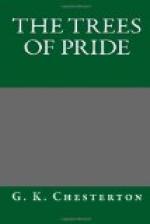“And what are you going to do with it?” asked Ashe.
“What I bet they haven’t done,” replied Cyprian. “I’m going to climb a tree.”
And with a quaint air of renewed cheerfulness he took himself away at a rapid walk to his inn.
He appeared at daybreak next morning outside the Vane Arms with all the air of one setting out on his travels in distant lands. He had a field glass slung over his shoulder, and a very large sheath knife buckled by a belt round his waist, and carried with the cool bravado of the bowie knife of a cowboy. But in spite of this backwoodsman’s simplicity, or perhaps rather because of it, he eyed with rising relish the picturesque plan and sky line of the antiquated village, and especially the wooden square of the old inn sign that hung over his head; a shield, of which the charges seemed to him a mere medley of blue dolphins, gold crosses, and scarlet birds. The colors and cubic corners of that painted board pleased him like a play or a puppet show. He stood staring and straddling for some moments on the cobbles of the little market place; then he gave a short laugh and began to mount the steep streets toward the high park and garden beyond. From the high lawn, above the tree and table, he could see on one side the land stretch away past the house into a great rolling plain, which under the clear edges of the dawn seemed dotted with picturesque details. The woods here and there on the plain looked like green hedgehogs, as grotesque as the incongruous beasts found unaccountably walking in the blank spaces of mediaeval maps. The land, cut up into colored fields, recalled the heraldry of the signboard; this also was at once ancient and gay. On the other side the ground to seaward swept down and then up again to the famous or infamous wood; the square of strange trees lay silently tilted on the slope, also suggesting, if not a map, or least a bird’s-eye view. Only the triple centerpiece of the peacock trees rose clear of the sky line; and these stood up in tranquil sunlight as things almost classical, a triangular temple of the winds. They seemed pagan in a newer and more placid sense; and he felt a newer and more boyish curiosity and courage for the consulting of the oracle. In all his wanderings he had never walked so lightly, for the connoisseur of sensations had found something to do at last; he was fighting for a friend.
He was brought to a standstill once, however, and that at the very gateway of the garden of the trees of knowledge. Just outside the black entry of the wood, now curtained with greener and larger leafage, he came on a solitary figure.
It was Martin, the woodcutter, wading in the bracken and looking about him in rather a lost fashion. The man seemed to be talking to himself.
“I dropped it here,” he was saying. “But I’ll never work with it again I reckon. Doctor wouldn’t let me pick it up, when I wanted to pick it up; and now they’ve got it, like they’ve got the Squire. Wood and iron, wood and iron, but eating it’s nothing to them.”




